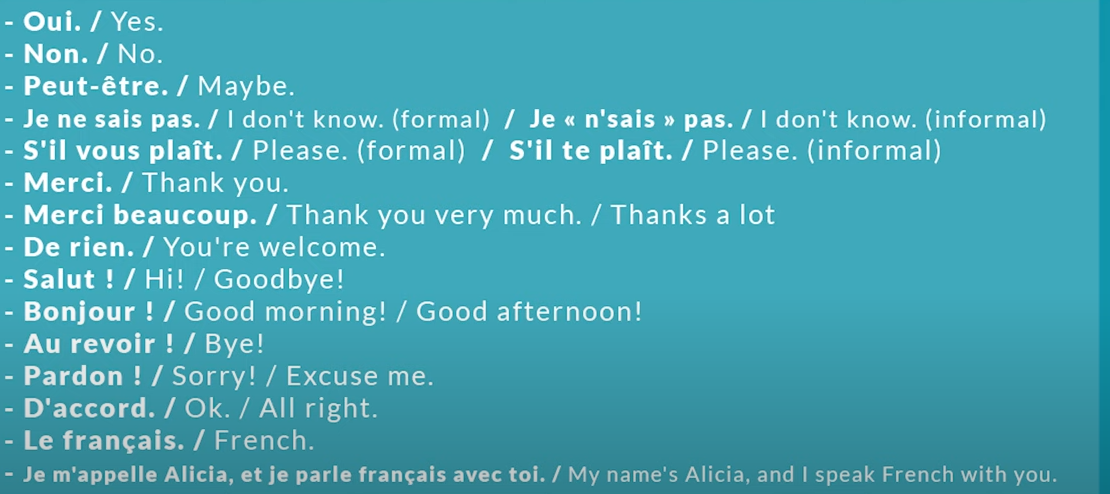French_A1_from_scratch
Français from 0 to A1
Basic Words and Expressions
- oui yes
- non no
- peut-ětre maybe/perhaps
- Je sais pas(informel). / Je ne sai pas(formel) . I don't know. abbr. Je <n'sai> pas (n is eated when speak quickly: Je sais pas, informal)
- S'il te plaît (informel). / S'il vous plaît (formel). Please.
- Merci. / Merci beaucoup. Thank you./ Thank you very much.
- De rien. You're welcome.
- Salut. ciao.
- Bonjour! Good morning! / Good afternoon!
- Au revoir. Goodbye. Au << r'voir >>(informel).
- Pardon. Sorry./Excuse me.
- D'accord. Okay./All right.
- le français French language
- Je m'appelle Gabriel, et je parle français avec toi/vous.

Masculine or Feminine
definite article
- le the (masculine singular)
- la the (feminine singular)
- les the (plural)
Masculine
- la maison (the house); les maisons;
- la voiture (the car); les voitures;
- la fille (the girl); les filles;
- la télé / la télévision (the TV); les télés, les télévisions;
- l' orange (the orange); les oranges; (zorange)
Feminine
- le livre (the book); les livres
- le garçon (the boy); les garçons
- le téléphone (the phone); les téléphones
- le chien(the dog); les chien
- l'ordinateur (the computer); les ordinateur (le zordinadeur)
Indefinite article
- un / une / des: a (masculine singlar) / (feminine singlar) / some(plural)
- verb "être" :to be: je suis / tu es / il est / elle est --->>> I am / you are / he is / she is
- verb "avoir": have. j'ai / tu as / il a / elle la --->> I have / you have / he has / she has
- J'ai la voiture bleue. I've got the blue car.
- Tu as le téléphone de Marc. You've got Marc's phone.
- Le chien de la fille est dans la maison. The dog of the girl is in the house.
- L'orange est sur l'ordinateur. The orange is on the computer.
- Je sui avec le garçon qui a les livres. I am with the boy who' got the books.
traduction -- translation
How to introduce yourself in French
Greetings
Bonjour. Good morning/afternoon.
Bonsoir Good evening.
Bonne journée. Have a good day.
Bonne soirée. Have a good evening.
Bonne nuit. Good night.
À bientôt! See you soon.
À plus tard. See you later.
À demain! See you tomorrow!
À lundi / mardi / mercredi / jeudi / vendredi / samedi / dimanche (See you on Monday to Sunday)
Salut, ça va? / ça va bien? / Tu vas bien? Hi, you all right? / Are you well? /Are you doing well?
Comment ça va? How are you doing? (neutral)
Comment allez-vous? How are you? (formal)
ça va / Tres bien, merci. Et toi?
Ca va bien. / Je vais bien. I am fine./I am doing well.
Comment tu t'appelles? What's your name.
Je m'appelle Gabriel. Et toi?
Quel âge as-tu? / Tu as quel âge? How old are you? (informal)
J'as [quinze / vingt / trente-sept] ans. I'm 15/20/27 years old.
Où habites-tu? / Où tu habites ? Where do you live?
J' habite à [Paris / Berlin / Porto / Tokyo / Shanghai] etc.
Je suis français. / Je suis française.
Je suis italien / allemand / chinois / turc / kurde / egyptien / thailandas / argentin. German / Kurd
- "Comment ça va ?"
- "Comment tu t'appelles ?"
- "Quel âge as-tu ?"
- "Où habites-tu ?"
- "Au revoir !"
French Vocab
- I am tired.
- Je suis fatigué. (masculine)
- Je suis fatiguée. (feminine)
- I am a male/female student.
- Je suis étudiant. (masculine) ze tu diant
- Je suis étudiante. (feminine)
- I am ready.
- Je suis prêt. (masculine) prai
- Je suis prête. (feminine) p re ci
- I am free tomorrow.
- Je suis libre demain. de mang
- I am married.
- Je suis marié.(masculine)
- Je suis mariée. (feminine)
French alphabet
La Chanson de l'Alphabet
Je connais les A, B, C
J'aime chanter les A, B, C
A[a] B[be] C[se] D[de] E[œ]
F[ɛf] G[ʒe] H[aʃ] I[i] J[ʒi]
K[ga] L[ɛl] M[ɛm] N[ɛn]
O[o] P[pe] Q[ky] R[ɛr] S[ɛs] T[te]
U[y] V[ve] W[dubləve] X[iks] Y[igrɛk] Z[zɛd]
ABCDEFG HIJKLMNOP QRSTUVWXYZ Maintenant je les connais
Toutes les lettres de l'alphabet
French 'r' Vocab
- répondre (to answer)
- la réponse (the answer)
- répondre, réponse
- regarder (to watch)
- rue (street)
- rat (rat)
- rouge (red)
- mercredi (Wednesday)
- parler (to speak)
- pourquoi (why)
- parce que (beacause)
- parfait (perfect)
- pardon (sorry)
- préféré (to prefer)
- prendre (to take)
- apprendre (to apprehend)
- vrai et vraiment (true and really)
- Il est vraiment sympa (He's really nice)
- très bien (very good)
- super (super)
- bar (bar)
- faire (to do, to make)
- dire (to say, to tell)